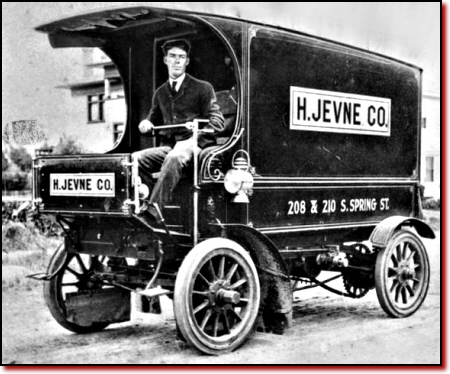
H. Jevne Co. motorized delivery truck
Thursday, February 15, 2007
Page 1
REMINISCING (Column)
H. Jevne Co. Offers Free Home Delivery
By ROGER M. GRACE
 |
|
|
H. Jevne Co. motorized delivery truck |
Hans Jevne, in the grocery business in downtown Los Angeles from 1882-1920, didn’t want to miss a sale. At some point quite early in his operations (perhaps right from the start), he determined that if customers in the vicinity couldn’t come to him—or did come but didn’t want to tote the groceries—he’d have the merchandise delivered to them.
While free home delivery by a grocery store was certainly not originated by Jevne, he eventually provided that service on an exceptionally grand scale.
He employed deliverymen at least as early as 1893. On Aug. 14 of that year, one of them was fined $2 in police court for failing to hitch his horse.
As of 1889, when “The Illustrated History of Los Angeles County, California” was published, H. Jevne Co. had 13 horses (and employed 27 men). His store, at 38 and 40 North Spring Street, had by then expanded from a single room in the building to both floors, according to the book.
In 1890, Jevne moved to a three-story building at 136 and 138 N. Spring St. (in the “Wilcox Block”), and in 1896 relocated to 208/210 S. Spring Street (in the newly opened “Wilcox Building”). Jevne continued to offer home delivery, shifting from reliance on horse-pulled wagons to motorized vehicles. That came some time after Jan. 19, 1898 when a reporter for the Evening Express rushed out to get a look at Jevne’s new “horseless wagon” only to find that it was simply one pulled by mules.
The photo appearing above was taken in 1906.
“[Y]ou need not come down town to order your groceries from Jevne,” a June 8, 1899 ad in the Times points out. “Telephone your order and you will get the best there is just the same as if you came in person.”
There was no minimum order to get home delivery. “Any telephone order filled,” a March 23, 1903 ad advises. One published Feb. 12, 1902 mentions that you could “telephone any time—we’ll send the bread out.” Loaves (baked daily by H. Jevne Co.) were priced at 5-cents and 10-cents.
On Friday, Dec. 21, 1900, an ad urged that orders for Christmas be placed early, remarking: “Today and tomorrow we’ll be able to handle everything nicely—and Monday we’ll do the best we can, but can’t promise such prompt deliveries.” Within three years, however, the delivery fleet had apparently been beefed up because a Dec. 21, 1903 ad vows: “Order today the things you want for a Christmas dinner, we’ll deliver them when you say.”
A May 31, 1913, Jevne ad in the Times ad declares:
“We make two deliveries daily to all principal parts of the city, three deliveries to apartment district, and once to Hollywood, Pasadena, et cetera.”
The Winter 1912-13 Jevne catalogue notes there were also weekly deliveries—each Monday—to San Gabriel...deliveries each Tuesday, Thursday and Saturday to San Rafael Heights and Annandale (now areas of Pasadena)...and Monday and Friday deliveries to Beverly.
At that point, Jevne had two stores: the one he was renting on Spring Street in the Wilcox Building (where the MetNews is now) and his own six-story building at Sixth and Broadway, opened in 1906.
There was no charge for the delivery or for boxes or crates. However, Jevne did require that where liquids were brought, payment be made for the jugs, jars, kegs or “demijohns” (defined by an online dictionary as “a large narrow-necked bottle usually enclosed in wickerwork”). Costs ranged from 10-cents for a half-gallon jug to $1.50 for a five-gallon boxed demijohn...with the payment refunded upon return of the vessel.
If you had a charge account, the delivered goods would be put on your tab; otherwise, payment was due on the spot. The catalogue notes, however: “Wines and Liquors cannot be shipped C. O. D.”
Copyright 2006, Metropolitan News Company